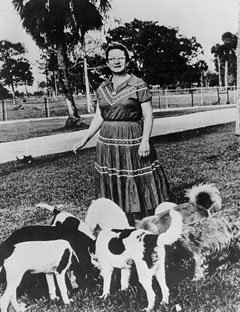When Eleanor E. Ritchey passed away in 1968, she left a lasting gift of her multi-million dollar estate to… her dogs? Mrs. Ritchey had 150 of them, according to court documents, and she left the entirety of her Quaker State Refining Corporation fortune to them when she died. Her will, which stated her wishes, was contested by her family.
The pups eventually received $9 million dollars in a settlement (must’ve had some lawyer), and the figure jumped to $14 million by the time it was disbursed.
When the last of Eleanor’s beloved pets died in 1984, the remainder of the balance was transferred to Auburn University, where it went to a research foundation dedicated to animal diseases. It just goes to show that a solid, well-written will is one of the most binding legal documents you can have, should something unfortunate happen to you or a loved one.

Each pup was tattooed to prove their membership in the original 150. The pets lived out their final days at a sprawling ranch in Florida.
Every Estate is Different, So Why Should Wills Be The Same?
Mrs. Ritchey’s case is not the only time a will has surprised its intended beneficiaries. Each individual and their estate is different, and the services of a dedicated legal advisor can help make sure there are no unpleasant findings when it comes time to disburse the material belongings a loved one has left behind.
In Pets We Trust: Looking After Your Companion in the Afterlife
Most states do not allow for pets to be named as direct beneficiaries in a will or last testament. Instead, it is advisable to set up what is call a “Pet Trust:” simply name a (human) beneficiary who you would want to take care of your furry friend, and establish a monetary trust with them as the beneficiary.
The caretaker of your pet (chosen by you) will then be supervised by a trustee, someone who is responsible for ensuring that Lassie is getting the care provided for her in your will. In most cases, it is wise to choose both a primary and secondary caretaker and trustee, in the case that your first choice is either unwilling or unable to perform their duties.
(Tip: Be sure to list the pet’s name, age, breed, genetic characteristics and defining physical traits in the legal document establishing their trust. This can help to prevent fraud.)
This type of “trust” legal structure allows for your pets needs to be met, and also eliminates any potential legal wrangling that may result from naming your cat or dog as a recipient of your estate.
Heidi Webb is a fully-qualified Estate Planning and Elder Law attorney. She practices primarily in Volusia and Flagler Counties, and is also well-versed in small business law. Heidi’s purpose as a lawyer is to make her clients lives just that much easier during what can be a very trying time, guiding them through a legal process that can seem overwhelming at times. If you live in Port Orange, Ormond Beach, Daytona Beach, or the surrounding areas, Contact Attorney Heidi S. Webb at (386) 257-3332 for a free consultation, and get the affordable, dedicated and compassionate legal counsel you need.



